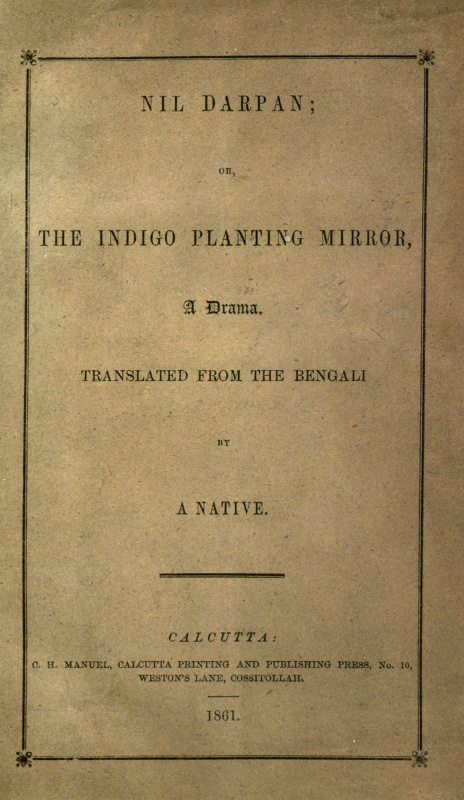Nil Darpan; or, The Indigo Planting Mirror, A Drama. / Translated from the Bengali by a Native.
Play Sample
INTRODUCTION.
The original Bengali of this Drama—the Nil Darpan, or Indigo Planting Mirror—having excited considerable interest, a wish was expressed by various Europeans to see a translation of it. This has been made by a Native; both the original and translation are bonâ fide Native productions and depict the Indigo Planting System as viewed by Natives at large.
The Drama is the favourite mode with the Hindus for describing certain states of society, manners, customs. Since the days of Sir W.Jones, by scholars at Paris, St.Petersburgh, and London, the Sanskrit Drama has, in this point of view, been highly appreciated.The Bengali Drama imitates in this respect its Sanskrit parent.The evils of Kulin Brahminism, widow marriage prohibition, quackery, fanaticism, have been depicted by it with great effect.
Nor has the system of Indigo planting escaped notice: hence the origin of this work, the Nil Darpan, which, though exhibiting no marvellous or very tragic scenes, yet, in simple homely language, gives the “annals of the poor;” pleads the cause of those who are the feeble; it describes a respectable ryot, a peasant proprietor, happy with his family in the enjoyment of his land till the Indigo System compelled him to take advances, to neglect his own land, to cultivate crops which beggared him, reducing him to the condition of a serf and a vagabond; the effect of this on his home, children, and relatives are pointed out in language, plain but true; it shows how arbitrary power debases the lord as well as the peasant; reference is also made to the partiality of various Magistrates in favor of Planters and to the Act of last year penally enforcing Indigo contracts.
Attention has of late years been directed by Christian Philanthropists to the condition of the ryots of Bengal, their teachers, and the oppression which they suffer, and the conclusion arrived at is, that there is little prospect or possibility of ameliorating the mental, moral, or spiritual condition of the ryot without giving him security of landed-tenure.If the Bengal ryot is to be treated as a serf, or a mere squatter or day-labourer, the missionary, the school-master, even the Developer of the resources of India, will find their work like that of Sisyphus—vain and useless.
Statistics have proved that in France, Switzerland, Holland, Belgium, Sweden, Denmark, Saxony, the education of the peasant, along with the security of tenure he enjoys on his small farms, has encouraged industrious, temperate, virtuous, and cleanly habits, fostered a respect for property, increased social comforts, cherished a spirit of healthy and active independence, improved the cultivation of the land, lessened pauperism, and has rendered the people averse to revolution, and friends of order.Even Russia is carrying out a grand scheme of serf-emancipation in this spirit.
It is the earnest wish of the writer of these lines that harmony may be speedily established between the Planter and the Ryot, that mutual interests may bind the two classes together, and that the European may be in the Mofussil the protecting Ægis of the peasants, who may be able “to sit each man under his mango and tamarind tree, none daring to make him afraid.”
